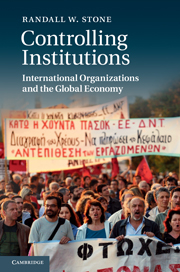Book contents
- Frontmatter
- Contents
- List of figures
- List of tables
- Preface
- List of abbreviations
- 1 Introduction: international organization and US power
- PART ONE THEORY
- PART TWO CASES
- 4 Informal governance in the IMF
- 5 The World Trade Organization
- 6 The European Union
- PART THREE HYPOTHESES
- Appendix: additional tables
- References
- Index
5 - The World Trade Organization
Published online by Cambridge University Press: 11 April 2011
- Frontmatter
- Contents
- List of figures
- List of tables
- Preface
- List of abbreviations
- 1 Introduction: international organization and US power
- PART ONE THEORY
- PART TWO CASES
- 4 Informal governance in the IMF
- 5 The World Trade Organization
- 6 The European Union
- PART THREE HYPOTHESES
- Appendix: additional tables
- References
- Index
Summary
Comparative cases provide useful counterpoints to the IMF, illustrating the broad sweep of the theory of informal governance, and also demonstrating that the theory can help to explain the substantial differences across international institutions for diverse issue areas. The cases chosen are the World Trade Organization and the European Union (EU). Important aspects of informal governance emerge in each of these organizations. Indeed, in each case, the informal practices play an essential role in institutional design, and ignoring them would lead to fundamental misunderstanding of how each institution functions. However, informal governance plays very different roles in each case, and I argue that the model presented in Chapter 3 sheds light on the variety of international organizations
The comparative statics of the model make strong predictions about institutional design. The expectation of long-term conflict of interest and the dispersion of structural power impose limits on the willingness of states to invest in jointly controlled institutions and lead to more formalization. However, we do not necessarily expect weak institutions to be associated with formalization because of the intervening effects of the returns to cooperation. When the returns to cooperation are high, states become willing to invest substantial powers in institutions even when the existence of multiple leading powers increases the costs of delegation. However, in order to minimize these costs, they choose formalized institutions that make delegating extensive powers more acceptable. Consequently, whenever extensive delegation arises under circumstances of multiple leading powers with substantially conflicting interests, it should take legalized forms.
- Type
- Chapter
- Information
- Controlling InstitutionsInternational Organizations and the Global Economy, pp. 80 - 103Publisher: Cambridge University PressPrint publication year: 2011



